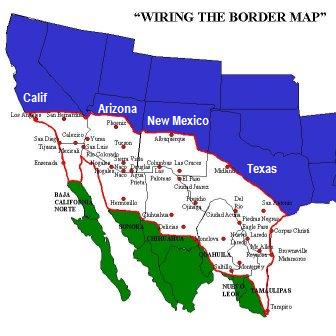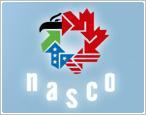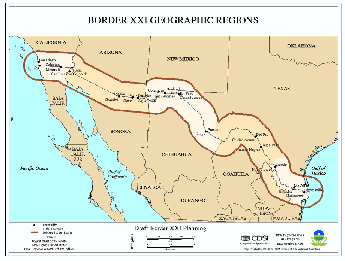|
Regional Expansion
Through Regional Development
Executive Order 13122, signed by Bill Clinton on May 28,
1999 expanded the Border Region to be defined as 150 miles
on each side of the border.
U.S. Treasury - Press Release - April 15, 2002 (PO-2095)
Geographic Scope and Financial Differentiation:
To expand the capacity of both institutions to address
important binational environmental needs, the geographic
scope for BECC/NADBank operations in Mexico will be expanded
from 100 km to 300 km from the border. The geographic limit
in the United States will remain unchanged at 100 km from
the border.
To ensure that
both institutions continue to focus on the priority
environmental needs of the immediate border region, this
geographic expansion will be coupled with a system of
financial differentiation. Specifically, grant financing
will be provided to the poorest communities located within
the current border region of 100 km in both countries, and
up to 25% of low interest rate lending may be made available
for projects located between 100 km and 200 km in Mexico.
Projects located between 200 km and 300 km in Mexico would
be allowed to borrow at standard NADBank interest rates and
receive normal technical assistance.
|
|
Border Region
Expansion
(like a cancer)

Map From
U.S.-Mexico Chamber of Commerce |
“Today, we are
strengthening our cooperative relationship by
welcoming the state of Chihuahua into the
Regional
Partnership for Progress,” Perry said.
“There is much that we must do as partners and
neighbors and much that can be accomplished when
we work together to promote our common interests
in a spirit of cooperation.”
In June, Perry
signed the same MOU with Gov. Tomas Yarrington of
Tamaulipas, Gov. Enrique Martinez of Coahuila, and
Gov. Natividad Gonzalez of Nuevo León.
The
agreement calls for an integrated approach to
regional economic development, public safety,
energy, telecommunications, health, infrastructure
and education. Chihuahua delayed signing
the MOU because the former governor’s term of
office was about to end.
Perry said that
the cooperative approach taken by the border
governors is helping create greater opportunity
and improve the quality of life for citizens on
both sides of the border.
“Together, we
have worked to tear down barriers to trade and
economic progress. Today, there are 12 separate
industries in Texas that export more than $1
billion in goods and products to Mexico each year
and our exports to Mexico were up 22 percent
during the first quarter of 2004,” Perry added.
“And increased trade with Texas is benefiting
workers on the southern side of the border too,
with more than half of the new jobs created in
Mexico linked to the export industry.”

North
America's Supercorridor Coalition
The list of accomplishments
on the NASCO website clearly shows the part that private
sector groups play in pushing the agenda. They bring
with them lobbying money from big donors to buy the votes of
Congress. Money for projects always buys the attention
of departments in government. What the NASCO MOU's
show is how the integration of the NAU governments is being
bought by the private sector groups. They write
legislation favorable to the agenda of their benefactors and
get it put into law. This really is the
communist system of government. A minority of elites
driving the agenda for their own personal benefit while
putting up the pretense that it serves the 'commons'.
In this regard, fascism is communism is socialism which is
institutionalized fraud.
From the NASCO website on their list of accomplishments
NASCO Key Successes & Outcomes
Memoranda of Understanding:
-
Created MOU with eight U.S.
states and a Canadian province
for continued cooperation
toward technology development
and infrastructure enhancement
of the I-35/I-29/I-94 Corridor
-
Created MOU with U.S. Treasury
Department to develop ITPC's
along I-35
-
Created MOU with the U.S.
Department of Energy, the
Environmental Protection
Agency, the United States
Postal Service and the Texas
General Land Office to promote
alternative fuels along the
corridor
Funding:
-
Known as the strongest
International Trade Corridor
Coalition on Capitol Hill
-
Lobbying efforts have helped
secure more than $150 million
in corridor transportation
project funding to date
-
Helped gain more than $79
million in Corridor projects
in FY03 through the National
Corridor Planning and
Development Program, ITS
Program, Interstate
Maintenance Program and the
Discretionary Bridge Program.
-
Contributed to the state match
of federal funds received for
a 2002 transportation
technology study -$15,000-
innovative financing from
NASCO
Lobbying Efforts:
-
Successfully lobbied for the
creation of two new categories
under the Transportation
Equity Act of the 21st Century
– the National Corridor
Planning and Development
Program and the Coordinated
Border Infrastructure Program
-
Formation of a Corridor Caucus
on Capitol Hill to promote
corridor development and begin
to organize as a corridor in
preparation of the next
re-write of the highway
legislation next year
-
Successfully lobbied to take
the Highway Trust fund
"off-budget" which resulted in
increased transportation
formula funding for NASCO's
corridor states
-
Awarded a seat on the North
American International Trade
Corridor DOT Steering
Committee to oversee the
development of the federally
funded ITS/CVO study along the
corridor
Successes:
-
Created the term
"International Trade Corridor"
now used internationally by
all corridor coalitions
-
Facilitated the creation of
Iowa's successful "Intelligent
Infrastructure" study
application for Federal
funding under TEA-21's
National Corridor Planning and
Development Program,
FY01-currently ongoing
-
Developed the "Clean Corridor"
concept –working to promote
the use of clean, alternative
fuels
-
Developed the concept of
International Trade Processing
Centers (ITPCs)
-
Provided a model for other
successful trade corridor
initiatives through its work
on I-35
-
Proven successful in bringing
transportation and trade
experts together for
substantive discussion
Firsts:
-
First ITC Coalition to become
an independent, not-for-profit
corporation
-
Introduced the International
Trade Corridor (ITC) concept
to Canada & Mexico
-
Intelligent Transportation
Systems (ITS):
-
Facilitated a meeting of the
NASCO corridor State
Department of Transportation
directors, secretaries and key
staff
-
Resulted in the submission of
a successful federal funding
application for an
ITS/Commercial Vehicle
Operations (ITS/CVO) study to
be conducted along
I-35/I-29/I-94 ITC
-
Said to be the best
application received by the
Federal Highway Administration
in 1999
|


